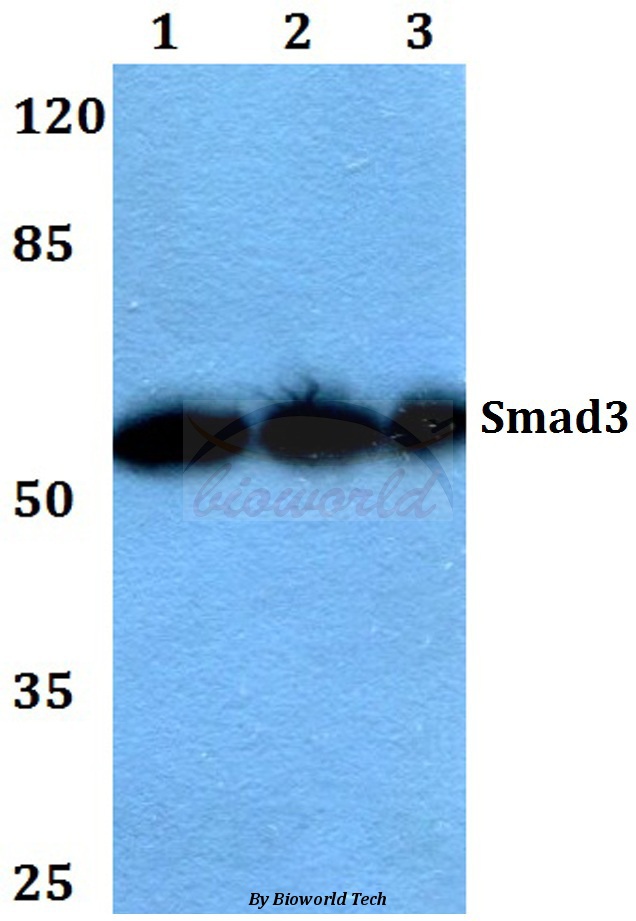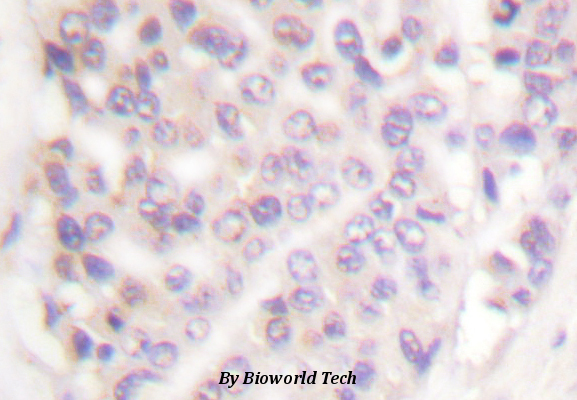Product Name :
Smad3 (P417) polyclonal antibody Background :
Smad proteins, the mammalian homologs of the Drosophila mothers against decapentaplegic (Mad), have been implicated as downstream effectors of GFβ/BMP signaling. Smad1 (also designated Madr1 or JV4-1) and Smad5 are effectors of BMP-2 and BMP-4 function, while Smad2 (also designated Madr2 or JV18-1) and Smad3 are involved in TGFβ and activin-mediated growth modulation. Smad4 (also designated DPC4) has been shown to mediate all of the above activities through interaction with various Smad family members. Smad6 and Smad7 regulate the response to activin/TGFβ signaling by interfering with TGFβ-mediated phosphorylation of other Smad proteins. Product :
Rabbit IgG, 1mg/ml in PBS with 0.02% sodium azide, 50% glycerol, pH7.2 Storage&Stability :
Store at 4°C short term. Aliquot and store at -20°C long term. Avoid freeze-thaw cycles. Specificity :
Smad3 (P417) polyclonal antibody detects endogenous levels of Smad3 protein. Immunogen :
Synthetic peptide, corresponding to amino acids 385-430 of Human Smad3. Conjugate :
Unconjugated Modification :
Unmodification
Smad3 (P417) polyclonal antibody Background :
Smad proteins, the mammalian homologs of the Drosophila mothers against decapentaplegic (Mad), have been implicated as downstream effectors of GFβ/BMP signaling. Smad1 (also designated Madr1 or JV4-1) and Smad5 are effectors of BMP-2 and BMP-4 function, while Smad2 (also designated Madr2 or JV18-1) and Smad3 are involved in TGFβ and activin-mediated growth modulation. Smad4 (also designated DPC4) has been shown to mediate all of the above activities through interaction with various Smad family members. Smad6 and Smad7 regulate the response to activin/TGFβ signaling by interfering with TGFβ-mediated phosphorylation of other Smad proteins. Product :
Rabbit IgG, 1mg/ml in PBS with 0.02% sodium azide, 50% glycerol, pH7.2 Storage&Stability :
Store at 4°C short term. Aliquot and store at -20°C long term. Avoid freeze-thaw cycles. Specificity :
Smad3 (P417) polyclonal antibody detects endogenous levels of Smad3 protein. Immunogen :
Synthetic peptide, corresponding to amino acids 385-430 of Human Smad3. Conjugate :
Unconjugated Modification :
Unmodification
-
 Western blot (WB) analysis of Smad3 (P417) polyclonal antibody at 1:500 dilution Lane1:MCF-7 whole cell lysate Lane2:Raw264.7 whole cell lysate Lane3:PC12 whole cell lysate
Western blot (WB) analysis of Smad3 (P417) polyclonal antibody at 1:500 dilution Lane1:MCF-7 whole cell lysate Lane2:Raw264.7 whole cell lysate Lane3:PC12 whole cell lysate -
 Immunohistochemistry (IHC) analyzes of Smad3 (P417) pAb in paraffin-embedded human breast carcinoma tissue.
Immunohistochemistry (IHC) analyzes of Smad3 (P417) pAb in paraffin-embedded human breast carcinoma tissue.
MAWBP and MAWD inhibit proliferation and invasion in gastric cancer
PMCID: Pubmed No.:23687415
Early growth response 2 (Egr2) plays opposing roles in committing C3H10T1/2 stem cells to adipocytes and smooth muscle-like cells.
PMCID: Pubmed No.:23751188
The effect of recombinant sTGFβ1RII and sIL13Rα2 receptor proteins on schistosomiasis japonica, hepatic fibrosis and signal transduction in a mouse model of schistosome disease.
PMCID: Pubmed No.:24746639
Maternal low-protein diet affects myostatin signaling and protein synthesis in skeletal muscle of offspring piglets at weaning stage
PMCID: Pubmed No.:25266448
C1q/tumor necrosis factor-related protein-6 attenuates post-infarct cardiac fibrosis by targeting RhoA/MRTF-A pathway and inhibiting myofibroblast differentiation
PMCID: Pubmed No.:25962701
Curcumin inhibits cobalt chloride-induced epithelial-to-mesenchymal transition associated with interference with TGF-β/Smad signaling in hepatocytes
PMCID: Pubmed No.:26302188
Silencing of HMGA2 suppresses cellular proliferation, migration, invasion, and epithelial–mesenchymal transition in bladder cancer
PMCID: Pubmed No.:26684800
Maternal low-protein diet affects myostatin signaling and protein synthesis in skeletal muscle of offspring piglets at weaning stage
PMCID: Pubmed No.:25266448
Silencing of HMGA2 suppresses cellular proliferation, migration, invasion, and epithelial–mesenchymal transition in bladder cancer
PMCID: Pubmed No.:26684800
The effect of recombinant sTGFβ1RII and sIL13Rα2 receptor proteins on schistosomiasis japonica, hepatic fibrosis and signal transduction in a mouse model of schistosome disease.
PMCID: Pubmed No.:24746639
Transforming growth factor-β1 and hypoxia inducible factor-1α synergistically inhibit the osteogenesis of periodontal ligament stem cells
PMCID: Pubmed No.:31465914
The Astragaloside IV Derivative LS-102 Ameliorates Obesity-Related Nephropathy
PMCID: Pubmed No.:35308255
Bone marrow mesenchymal stem cells therapy on bilateral pelvic nerve crush-induced voiding dysfunction in rats
PMCID: Pubmed No.:35451617
Bioworld Biotech only provide peptides for our antibodies and do not provide additional peptide customization services.
Price/Size :
USD 368/1mg/vial
Tips:
For phospho antibody, we provide phospho peptide(0.5mg) and non-phospho peptide(0.5mg).Describe :
Blocking peptides are peptides that bind specifically to the target antibody and block antibody binding. These peptide usually contains the epitope recognized by the antibody. Antibodies bound to the blocking peptide no longer bind to the epitope on the target protein. This mechanism is useful when non-specific binding is an issue, for example, in Western blotting (WB) and Immunohistochemistry (IHC). By comparing the staining from the blocked antibody versus the antibody alone, one can see which staining is specific; Specific binding will be absent from the western blot or IHC performed with the neutralized antibody.Formula:
Synthetic peptide was lyophilized with 100% acetonitrile and is supplied as a powder. Reconstitute with 0.1 ml DI water for a final concentration of 10 mg/ml.The purity is >90%,tested by HPLC and MS.
Storage:
The freeze-dried powder is more stable. For short time at 2-8°C. For long term storage store at -20°C.
Note :
This product is for research use only (RUO only). Not for use in diagnostic or therapeutic procedures.
 Smad3 (P417) polyclonal antibody
Smad3 (P417) polyclonal antibody  Datasheet
Datasheet COA
COA MSDS
MSDS SHIP
SHIP